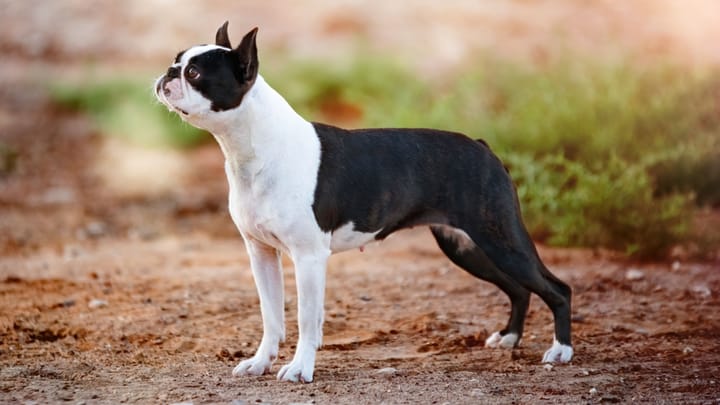Boston Terrier


The Boston Terrier is sweet, cheerful and above all very pleasurable to live with on a daily basis due to its good character and intelligence. These dogs are sociable, get along well with their peers and appreciate the presence of children. Although very attached to their social group, they are nevertheless still terriers that sometimes do as they please. Seducers at heart, they know how to make people understand what they need and, in particular, how to convince their loved ones to get what they want.
|
Life expectancy |
The Boston Terrier has a life expectancy of between 13 and 15 years |
|
Temperament |
|
|
Size |
Small
|
|
Adult size |
Female
Between 10 and 16 in
Male
Between 10 and 16 in
|
|
Adult weight |
Female
Between 13 and 24 lb
Male
Between 13 and 24 lb
|
|
Coat colour
The coat of this little molosser can be either brindle, and white or black and white. They have a white stripe at the muzzle, a white stripe between the eyes and white at the breast corresponding to their official standard. |
Black White Brown |
|
Type of coat
Their hair is short. Their coat is smooth, shiny and of a fine texture. |
Short |
|
Eye colour
The eyes are dark. |
Brown
|
|
Purchase price |
The Boston Terrier costs between £810 and £980 |
The Boston Terrier is a truly versatile companion dog, but until recently it was poorly represented outside the United States. The existing breeds are of very good quality, but it is necessary to book the puppies well in advance.
In recent years, this breed has enjoyed great popularity, just like their cousin the French Bulldog to whom they are often compared to or mistaken for.
They are nicknamed the gentlemen of dogs because of their black and white coat which gives the impression that they sport a tuxedo.
More details about the Boston Terrier
Boston Terrier: Origins and history
Almost nothing is known about the Boston Terrier’s origins, except that they evolved most significantly in the United States, in the city of Boston, from which they got their name. The Boston Terrier seems to have evolved through the crossbreeding of the English Bulldog and the English White Terrier. However, the French Bulldog must have also been involved as the Boston Terrier resembles them a great deal. The American breed evolved in 1891 and two years later, it was recognised by the AKC (American Kennel Club), the equivalent of the Kennel Club in the UK. The breed was introduced in 1901 in the UK.
Physical characteristics of the Boston Terrier
The Boston Terrier is a robust, small dog. Their head is composed of a flat, square skull, not heavy, a steep forehead, a well-defined stop and a short, broad, square muzzle. The teeth are slightly prognathic. The eyes, wide apart, are very large, round and dark, with an attentive and gentle expression. The ears, usually cut, are small, thin, and straight. The legs are straight, muscular and well balanced. The tail, short and low, can be straight or oblique; it is carried horizontally. It should be noted that there are three varieties of weight: less than 15 lbs, between 15 lbs and 20 lbs and between 20 and 25 lbs.
FCI classification of the Boston Terrier
-
Group 9 - Companion and Toy Dogs
-
Section 11 : Small Molossian type Dogs
Boston Terrier: Characteristics
Boston Terrier: Behaviour
Training a Boston Terrier
Sometimes determined, like any good self-respecting terrier, it is necessary to introduce rules and limits at home as soon as the Boston Terrier puppy arrives, to avoid being overstepped.
The advantage of this small companion dog is that they are very energetic and attentive, which makes the different learning processes quick, and all the more so when they are provided in a consistent, coherent and fair manner.
In short, the Boston Terrier is not a difficult dog to train if the educational methods are simultaneously firm and gentle and respect the principles of positive education.
Boston Terrier: Lifestyle
Breed compatibility Boston Terrier
Boston Terrier: Purchase price
The price of a Boston Terrier varies according to its origins, age and sex. It is necessary to count on average £980 for a dog registered with the KC.
Concerning the average budget to support a dog of this size, it is necessary to account for approximately £20/month.
Boston Terrier: Shedding
Average
Hair loss is moderate but increases considerably during moulting periods, mainly in autumn and spring. They require daily brushing to remove dead hair.
Boston Terrier: Grooming
Neither exhausting nor constraining, the Boston Terrier is very easy to maintain, thanks in particular to its short and smooth coat. A few regular brushing sessions are enough to maintain the cleanliness and beauty of their coat.
In addition, their eyes and ears must be regularly monitored and cleaned to avoid infection.
Boston Terrier: Health
Life expectancy is estimated at around 14 years.
The Boston Terrier is a small dog that is very robust considering its size and can live for a very long time. However, their coat does not allow for them to properly withstand harsh or cold weather properly, so they are somewhat fragile.
Although much less sensitive to heat than its cousin Bulldog, the Boston Terrier is still fragile and can suffer from respiratory problems. Thus, outings must be carried out early in the morning and late in the evening in summer and regularly renewed water must be made available to them.
This small dog's short, smooth coat does not allow it to withstand the elements, cold or harsh rain. Thus, in winter, they are happy at home and it can be worth considering a coat for them to go out in.
If their dietary portions are balanced, controlled and adjusted, this companion dog has no particular reason to gain weight, other than a lack of physical activity and the overconsumption of snacks between meals.
- Eye irritation
- Breathing difficulties
- Birth complications for pregnant females
- Skin problems







